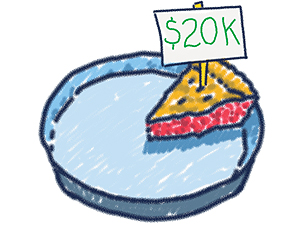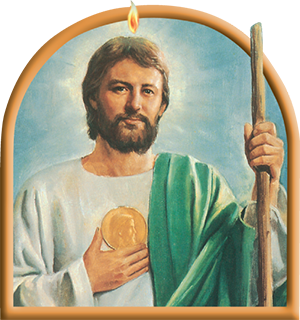A poor measure of poverty
 Low-income Americans deserve a bigger piece of the pie.
Low-income Americans deserve a bigger piece of the pie.
IF YOU SUPPORTED A SPOUSE AND TWO CHILDREN ON $20,000 A YEAR, you might get by spending only about $8,000 of that on housing, perhaps $2,500 on utilities, $5,000 each on transportation and food, $1,000 on health care, maybe $2,000 on child care, and whoops! Dude, you were out of money a long time ago, and we haven’t bought your family a stitch of clothing or a bar of soap, a single toy for your kids or cup and saucer for your kitchen, a lousy DVD rental or, come to think of it, just about anything else a body might consider the default components of contemporary American life.
You probably think you’d be pretty hard-up living on that $20K, but not according to the U.S. Census Bureau. You don’t actually slip into the state of poverty, according to those guys, until your income drops below $19,900.
But don’t worry. Once there, you’re in good company. In its most recent profile of poverty in the United States, the bureau reports more than 37 million of our fellow citizens, nearly 13 percent of the U.S. total, live in poverty. The good news, I guess, is that those numbers appear to have stabilized after rising each year since 2000.
Folks on the right argue the flat-lining of poverty reflects the effect of a tax-cut juiced free market, invisibly handing down economic rewards to all. Folks on the left cast a gloomier eye on the daunting raw data and predict even greater wealth and power disparities in a future America of overstuffed have-too-muches and hat-in-hand have-littles.
Whatever your political bent, no one can be happy that nearly 20 percent of America’s children are growing up poor; no one can remain complacent when nearly 25 percent of all African American citizens and 22 percent of Hispanic citizens remain mired in another generation of poverty.
And before anyone gets too carried away crowing over the glories of America’s recent economic growth, let’s remember many economists argue that a more realistic measure of lived poverty in America would essentially double the percentage of people living in a redefined state of poverty. While economic analyst Ron Haskins of the Brookings Institute doesn’t discount the Census Bureau model—he calls it a “decent” tool for tracking broad trends in U.S. poverty—he does admit that by most measures $20K for a family of four is probably too low.
An accurate poverty formula would take into consideration both regional distinctions and differences in urban and rural cost of living. It would add expenses, like out-of-pocket medical costs, currently left out, and redefine income to include federal anti-poverty interventions such as food stamps and the earned-income tax credit. That might achieve a more nuanced and accurate picture of U.S. poverty, but it would be one that would probably make few people happy, especially in Washington, where real policy would have to be produced out of those numbers.
“There are big bucks riding on these definitions of poverty,” Haskins says. A dramatic reappraisal could mean cuts in federal spending in rural counties and increases in urban zones. That’s partly why he thinks the current poverty measure is unlikely to change any time soon. “Here’s a general rule in Washington,” Haskins says. “If you take any action that creates winners and losers in the federal money that goes to the states, you’re in for real trouble.”
Why America’s political culture resists revamping the poverty line is not hard to understand. After all, acknowledging that the world’s largest military and economic power, a nation with a $12 trillion annual economy, allows nearly a quarter of its citizenry to subsist in poverty is not the greatest ad copy for the neoliberal, new world order. ’Fessing up could lead to a public outcry for costly federal mitigation that would interfere with more pressing fiscal priorities like tax cuts and war-making. While we exhibit a great deal of tolerance for annual adjustments to the defense budget and seek out creative ways to keep money in the pockets of the well-heeled, U.S. policymakers have not indicated a parallel willingness to share the wealth with the poor.
What? New clothes, new cups and saucers, DVDs!? We wouldn’t want to spoil you guys.
Kevin Clarke is a senior editor at U.S. Catholic and managing editor of online products at Claretian Publications. This article appeared in the November 2006 (Volume 71, Number 11; page 38) issue of U.S. Catholic.
